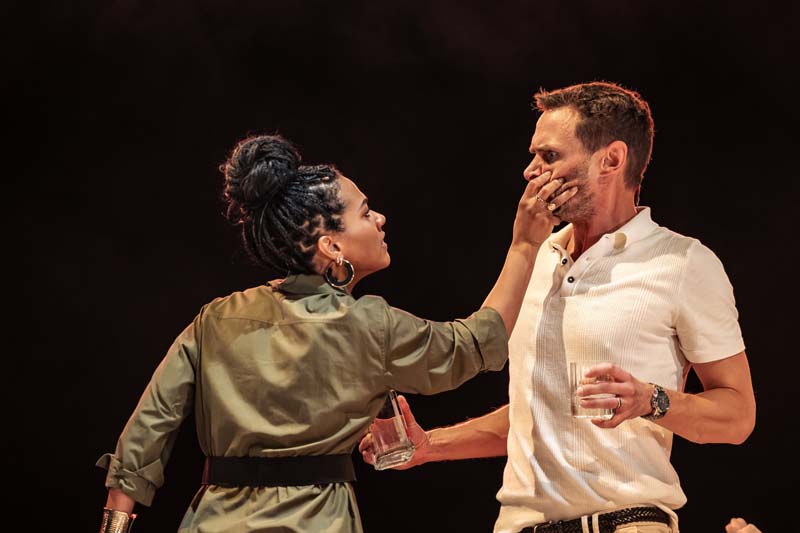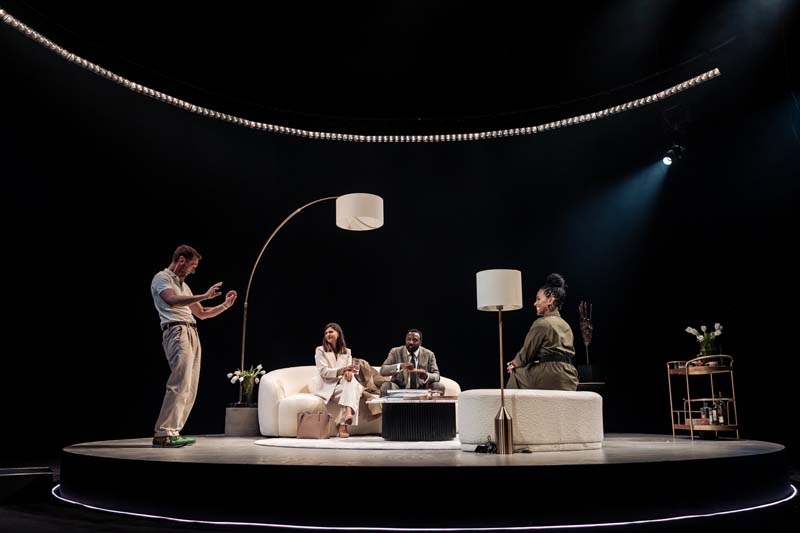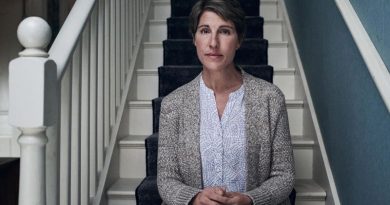“God of Carnage” at Lyric Hammersmith
Neil Dowden in west London
12 September 2023
French playwright Yasmina Reza is best known for her dark comedies satirizing the prejudices and hypocrisies of the educated, cultured middle classes. Lyric Hammersmith now revive her 2006 play God of Carnage (translated by regular collaborator Christopher Hampton, who first worked with Reza on Art in the ‘90s) which went on to win Olivier and Tony Awards, and was filmed as Carnage by Roman Polanski in 2011. With witty, razor-sharp observation, it reveals how thin the veneer of civilization is when primal feelings come to the fore.

Freema Agyeman and Matin Hutson.
Photo credit: The Other Richard.
The Novaks and the Raleighs, two bourgeois couples, meet in the Novaks’ apartment in order to have a constructive discussion about a violent incident involving their two respective 11-year-old sons. In a local park, the Raleighs’ son has knocked out two of the other boy’s teeth with a stick after the latter refused to let him join his “gang”. The parents are keen to avoid any legal involvement, with the Raleighs agreeing to pay for any dental treatment, while they hope the boys can also repair their friendship. But the enlightened mood and courteous manners dissolve after the Raleighs stay on for homemade apple and pear clafoutis and coffee (and later a bottle of white rum), when the tensions just below the surface erupt into ugly recriminations and insults.
The gradual descent into chaos is cleverly engineered. The children have had an instinctive confrontation (which hopefully they will learn from), but the adults have no excuse for their wilfully degenerate behaviour. The differences between the more liberal, cultured Novaks (Veronica works in an art bookshop and writes books on postcolonial Africa, while Michael runs a small wholesale hardware business) and the more prosperous, materialistic Raleighs (Alan is a corporate lawyer, Annette is a wealth manager) harden into incompatible world-views.
But the subtlety of Reza’s writing means that our stance towards the protagonists is constantly changing – they are all flawed in their own ways. And the divisions are not just between the two couples but within the couples and also between the men and the women. Veronica prides herself on being progressive but her holier-than-thou attitude is alienating, while her public put-downs of her husband (including a hilarious sub-plot involving a pet hamster) whom she regards as too negative riles the nerdy Michael into counterattack. The normally demure Annette becomes enraged with her husband’s lack of support as he is constantly taking calls on his mobile phone, with the “alpha-male” Alan rudely dismissive of “domestic” concerns.

Set by Lily Arnold.
Photo credit: The Other Richard.
There is an attempt to connect the dodgy pharmaceutical drug that Alan is defending on behalf of his client with the same drug taken by Michael’s elderly mother (who also repeatedly phones much to his annoyance), but it doesn’t convince as a wider critique of capitalist society. However, the play’s evolution from awkward social comedy to anarchic physical farce is brilliantly done, as the characters get drunk and release their frustrations, while coffee-table books are covered in projectile vomiting, a phone is dunked in water, and tulips are thrown about.
Nicholai La Barrie’s well-paced, interval-less 90-minute production gets the most out of the play’s sitcom-like moments, without neglecting the more serious undercurrents. It’s a brilliant idea to stage the show on a super-slow revolve, which reinforces our shifting perspectives of the characters as they reveal themselves further. Lily Arnold’s stripped-back design suggests a chic living room with modish furniture, drinks trolley, art books, and a tribal mask hinting at primitive instincts as well as cultural appropriation.
The accomplished cast play off each other superbly. Freema Agyeman is the domineering Veronica who cannot resist pointing out how the others fall short of her high ethical standards, while Martin Hutson is extremely funny as the passive aggressive Michael who has had enough of being the fall guy. Ariyon Bakare’s arrogant and condescending Alan believes “boys will be boys”, and Dinita Gohil’s Annette reverts from sympathetic listener to bellicose provocateur as civility sinks into carnage.









